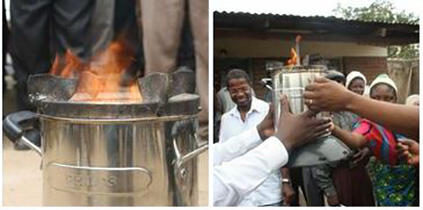
The Medical Research Council (MRC) has announced £580,000 of funding to facilitate collaboration between established trial sites and to increase research capacity in Africa focused on the health effects of Household Air Pollution (HAP). HAP has been identified as a major preventable cause of disease and death in the Global Burden of Disease survey 2010.
The BREATHE Africa partnership (Biomass Reduction and Environmental Air Towards Health Effects) is led and co-ordinated by Stephen Gordon and Jane Ardrey at LSTM. The Partnership will draw together experts and investigators in major air pollution trials in order to share findings and plans, harmonise specific aspects of trial methodology, optimise the opportunity to undertake mechanistic work, including testing for new biomarkers not funded in current trials and to engage African researchers and trainees in existing and new studies by a bottom-up approach offering mentored research training projects.
There are five themes for the work and four additional Co-investigators from LSTM (Dr Kevin Mortimer), University of Liverpool (Prof Nigel Bruce), University of Aberdeen (Dr Sean Semple) and Queen Mary University of London (Prof Jonathan Grigg), focused on Interventions to reduce HAP, Exposure and Biomarker measurements, and Mechanisms by which HAP causes Health effects. BREATHE currently has 50 partners and those partners contributing financially are The Global Alliance for Clean Cookstoves (Alliance) and The American Thoracic Society (ATS).
The partnership will work with existing Cookstove projects that are currently underway in Ghana and Nepal as well asthe Cooking and Pneumonia Study (CAPS), which is an LSTM led, randomised study being carried out in Malawi.
Professor Stephen Gordon, who is the head of LSTM’s Department of Clinical Sciences, said: “Half the world’s population, including some 700 million people in Africa, use biomass fuel from animal and plant material to provide energy for cooking, heating and lighting. Those using biomass fuel and their young children experience substantial smoke exposure, which is an established threat to health. This new partnership will bring together international experts, African Investigators and other stakeholders to ensure the best use of new opportunities provided by £8m of recent grant investment directed at quantifying and reducing the health effects of household air pollution.”
The funding, along with a benefactor donation of £32,000, will also enable the continuation of The Pan African Thoracic Society – Methods in Epidemiological, Clinical and Operations Research (PATS MECOR) Course for 2014. The course, which was initiated by Professor Gordon, is designed for pulmonary clinicians, investigators and academicians to provide training in research methods and will take place in Kenya in September.